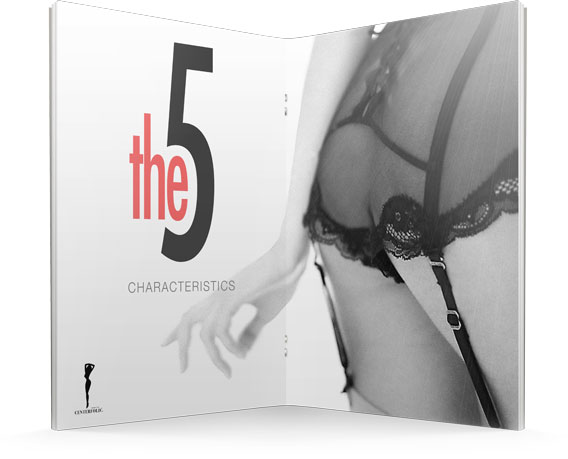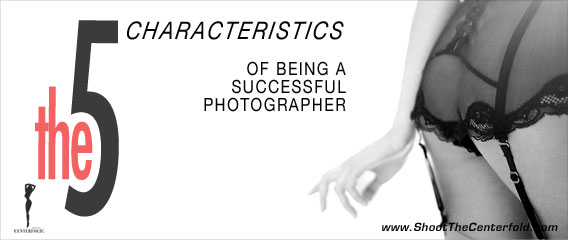The Five Characteristics of Being a Successful Photographer
 Many people attribute the achievements of a successful photographer to natural ability, favorable conditions and opportunities, or because they chose the right school or learning method. While these characteristics are all inherent in being successful, they do little to explain why so many self-taught photographers reach high levels of proficiency without the help of any of these, or why others, despite having every advantage imaginable, fail miserably.
Many people attribute the achievements of a successful photographer to natural ability, favorable conditions and opportunities, or because they chose the right school or learning method. While these characteristics are all inherent in being successful, they do little to explain why so many self-taught photographers reach high levels of proficiency without the help of any of these, or why others, despite having every advantage imaginable, fail miserably.
There’s something much more basic to it, something that has more to do with personality and psychology than knowing the business end of a camera. There are certain traits, attitudes and learning habits that go past ordinary learning and transcend into multidisciplinary education.
1. They are Inherently Motivated to Learn
Successful photographers have a very strong sense of purpose for their work. Whether it’s conscious or subconscious, a photographer must maintain an internal resource of motivation. No one else can give you a better reason to learn than you. Being influenced by external factors, such as financial security, travel, or notoriety is common, but the only way to succeed is to want it more than anything else and to study and prepare.
Having a strong inherent motivation will help prioritize your learning process, force you through difficult times when you’re sick – or even when you’re bored silly – and help you to enjoy your craft.
Remember, the best way to learn is to have fun!
2. They Take Responsibility for Their Learning
While being inherently motivated is a good start, it won’t take you all the way to the finish line if you’re not ready to take the responsibility of improving your work. This helps you to recognize your own crucial role in the learning process, and that no matter how much you pay someone to teach you, no matter how many books you buy or seminars you attend, no matter how much you spend on equipment, YOU have to be the one to put in the hard work to get it done.
Successful photographers don’t look for a magic solution or think success will come overnight, and they also know that a few lessons here and there will not bring the level of success they seek and desire. They evaluate what works and what doesn’t, they experiment, and they take their work into their own hands. Because they take responsibility for their education, they learn at every step of the way and enjoy the rewards it brings because they know they deserve it.

3. They Connect Their Work to Their Life
Because successful learners are inherently motivated and responsible, they are quick to discover the most effective learning approach is to make it as real as possible. They connect their work to the things they enjoy in their private life and the it becomes a personal life experience in itself. This may be very difficult at first and demand a great deal of patience, but it gets easier and easier as you progress and get involved with putting yourself into your work.
Perhaps the biggest mistake most photographers make is keeping their personal and professional life separate. What must be understood is that while your work is part of your life, your life isn’t your work. Just as in writing, movies and music, the individual artist must rely on an inner source to give their work credibility and trigger a response in their readers, viewers and listeners through the universality of shared emotions.
A photographer must put their life experiences into their work for it truly to become an expression of their unique perspective. The inevitable result of this is that your work becomes a natural and instinctual part of your world.
4. They Aren’t Afraid to Make Mistakes
One of the most universal traits and characteristics of successful photographers, or in any vocation or occupation, is the willingness to take risks and fail. This is especially true of photography. If you want to be successful, you’re going to have to pick up a camera and start making mistakes. The problem is that this is one of the most difficult things to do. A major reason people don’t like this approach is that most teachers and learning methods don’t promote mistakes as  part of the natural process.
part of the natural process.
It takes a brave person to make mistakes and fail. It also takes a good dose of confidence, humility and perseverance. It’s not something that happens overnight, but if you realize the importance of it and put yourself out there, it can happen pretty quickly sometimes.
5. They Build Support Networks
The final characteristic of a successful photographer is that they participate in and create support networks. This includes colleagues, teachers, role models, friends, family and professional associates. We all know that no matter what you do in life, it’s a good not to have to go it alone. It’s even better when our support group consists of community of people who are on a similar path because it’ll help us get there faster. This is especially true of photography because it’s a visual communication system and can’t be learned the same way as other subjects. We all can look, but not everyone can see.
All of these tips and suggestions come down to the fact that nobody else can learn photography for you, and you can’t pay somebody to give you what you need. Sure, there are plenty of self-taught photographers who never paid anybody for anything, but have reached impressive levels of photographic proficiency.
To be a great photographer, you need to start working on yourself first, not your camera. Way too many photographers fail because they think all they have to do is pay somebody, listen to a few instructions, buy a few books and go to some seminars, all the while ignoring the internal dimensions and requirements.
When you focus on developing these characteristics in your photography, you will become more developed, disciplined and self-directed, not just with your work, but as a person.
www.ShootTheCenterfold.com

© 2014 Copyright ShootTheCenterfold.com. All rights reserved.




















For me #4 has been the most important as far as coming up with my own style. When I switched from film to digital I became much more free to try new ways of shooting and see my mistakes as they happened. I became much more daring and creative shooting and my photography improved exponentially.